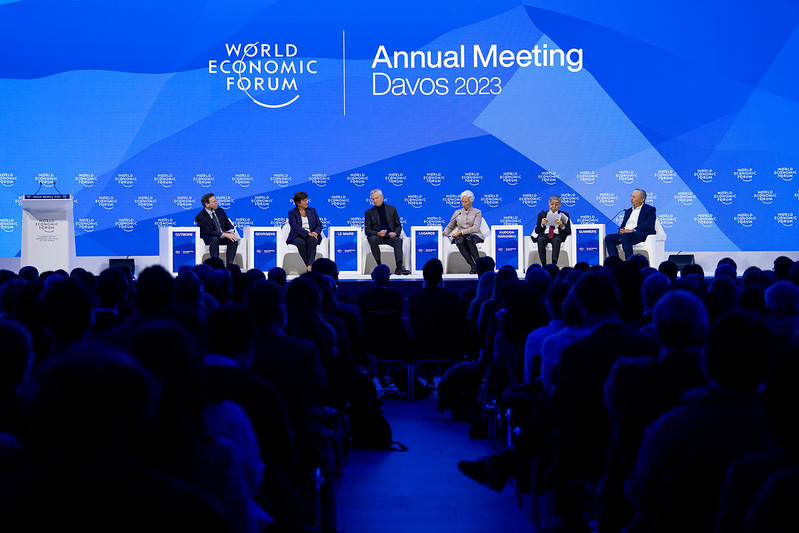At the 53rd World Economic Forum (WEF) Annual Meeting in Davos, the focus was on trade, tech and tackling the climate crisis. But what else hit the mark? And what were the key takeaways?
The WEF returned to the Swiss Alpine town of Davos for its first winter meetup since 2020. More than 2,700 leaders, including over 350 heads of state, government figures and ministers, met under the theme ‘Cooperation in a Fragmented World’ and with a rallying cry for ‘unity and collaboration’.
Four key things
According to regtech Clausematch, there were four main takeaways from Davos this year.
- The world needs a unified approach to sustainability, economic, and health-related challenges
- Innovation in technology should be celebrated
- A global recession is likely this year, but leaders are more optimistic than before
- Urgent action is needed to tackle the climate crisis
Back to normal
Efi Pylarinou, an independent fintech and blockchain advisor, described Davos as feeling “back to normal in terms of attendance and intensity”. In her blog, she described the main themes as a “mesh of Web3, blockchain, crypto and SDGs/ ESG” though what struck her this year is that “there was no major event with an AI focus”.
Confidence boost
Bill Winters, group chief executive at Standard Chartered, said he felt a renewed sense of optimism in Davos this year, compared to 2022. In a LinkedIn post, Winters commented: “Despite challenges on multiple fronts including growing inequality, geopolitical tensions and climate change, both the world and business leaders see a opportunity to accelerate the positive changes that are already underway.
“The re-opening of China and its impact on the global economy has also given the world a much needed confidence boost. As we navigate the changing nature of globalisation, we need to ensure that this next phase of global change is inclusive and sustainable.”
Innovation is key
Rob Bennett, CEO of SMB4.0, the organisation that powers the Network of Giving, said it was exciting to meet so many young entrepreneurs at Davos who are using creativity and innovation to help the world.
He told The Fintech Times: “We heard from many of the guests, at our Network of Giving House venue, how they saw the value of the Network of Giving and stressed that as much as this annual meeting was about addressing the world’s issues, real change begins on a more granular level, by strengthening communities, villages, towns that are the building blocks for a global movement.
“Innovation is key and there is plenty of it in Davos. Almost too much and it can be overwhelming. We were excited to meet so many young entrepreneurs who are using creativity and innovation to help the world. It was inspiring. New ways become the ‘old ways’ quite quickly and one has to be open to and adopt change in order to grow. Financial institutions and world leaders must embrace the new ways and be open to adoption and application now more than ever.”

Distractions
Bennett continued: “Similarly, there are a lot of ‘shiny objects’ in Davos during the annual meeting. It can be quite distracting. If one can focus, one can find the real gems.
“Overall impression is, there is hope, because of the talent, determination and commitment by talented people and organisations, but it does not always start at the top nor with blind faith. We cannot forget that 72 per cent of the world’s business is small to medium enterprises and we must support those that strengthen that foundation in order to continue the movement for improvement and change.”
Future of Web3
Nilmini Rubin, chief of staff and head of policy at Hedera, said Davos highlighted how industry leaders, Web3 organisations, and regulators can work together to rebuild trust in the crypto industry.
“As we move on from the events of last year, we must work together to remind people of the benefits of distributed ledger technology – and one key way to do this is by offering tangible, impactful case studies. The current bear market has created a valuable opportunity for the bigger players in the blockchain and crypto industries to exert a more principled influence over the future of Web3.
“Organisations in this space should cooperate with regulators to ensure that all policy decisions balance innovation and the protection of end-users. The general consensus in Davos was to act and appear legitimate and secure, industry players must clearly communicate what they offer and how they operate upfront. This then allows the decision-making and due-diligence transparency that we’ll take forward with us into the industry’s next chapter.”
Inclusive innovation
Detria Williamson, an advisory board member at tech talent marketplace MVP Match, is an advocate for inclusive innovation and believes board level roles for such companies are critical.
“This year at Davos, I met a more diverse mix of leaders, particularly across fintech. I am proud to see WEF going in that direction. Davos is a key enabler to maintain and grow your fintech network across a variety of events around the Congress Centre. I enjoyed the company of fellow leaders passionate about making a positive impact in the world through their businesses and ventures. I am looking forward to seeing the topics and ideas discussed at Davos unfold and formalise into impactful action.
“One of the key takeaways I took from Davos is that for effective climate change, actions taken should promote inclusivity, with ‘non-conventional’ leaders at the decision table. We need to integrate design thinkers, digital transformation experts, creatives and innovators at the early stage of product design, system levels, policy levels, and early investment rounds as opposed to limiting the key stakeholders to engineers and investors.”

Inclusive and accessible
Williamson continued: “When we come together, it’s ground-breaking. When decisions are made for protecting our planet, there is value in leaders from various backgrounds and different perspectives. On the client level, for example, an airline recently started offering air travellers to buy carbon credits.
“While the initiative is welcome, travellers who struggle to save money for years to travel are excluded from participating in the planet-positive agenda with this as an added cost. We should consider this being embedded into the ticket cost versus as an optional added cost or through providing other ways to participate. Having inclusive design broadens participation overall and ultimately drives growth so it’s a win-win.
“On the leadership level, companies that are disrupting conventional industries can accelerate our planet’s positive agenda through leaders with diverse backgrounds. Fintech, for example, disrupts by redefining capital, banking, and wealth overall.
“This can ensure the way forward is inclusive and accessible. Fintech can learn from the mistakes of other industries and implement methodologies and strategies that are inclusive and leave a positive impact on the environment. Whether internally through diverse leaders and teams or externally through advisors that specialise in inclusivity and sustainability.”




